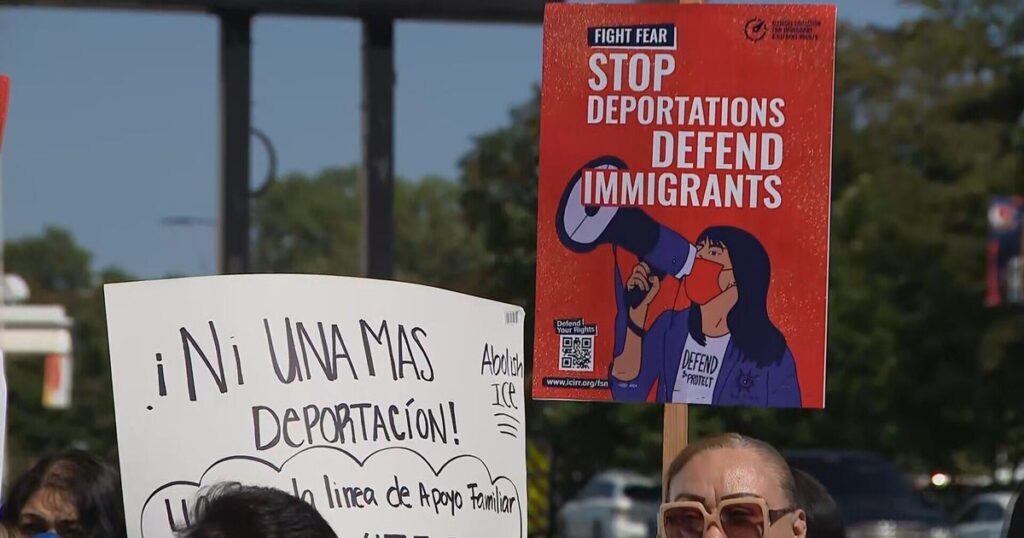Tensions are escalating in Chicago as the Trump administration’s Immigration and Customs Enforcement (ICE) ramp up raids under “Operation Midway Blitz.” Local community members, particularly immigrant rights advocates, are alarmed by the presence of federal agents targeting vulnerable populations. Many residents have expressed their fears, and some community events have been postponed in light of the intense climate of anxiety surrounding immigration enforcement.
| Article Subheadings |
|---|
| 1) Rising Tensions Amid ICE Raids |
| 2) Community Response and Fear |
| 3) Government Justifications and Concerns |
| 4) Perspectives from Community Leaders |
| 5) The Larger Context of Immigration Policy |
Rising Tensions Amid ICE Raids
In recent weeks, Chicago has witnessed an increase in the visibility and activity of ICE agents, leading to heightened anxieties among immigrant communities. This initiative, dubbed “Operation Midway Blitz,” has drawn both attention and concern from local residents and politicians alike. The operation coincides with a broader national strategy aimed at curving illegal immigration and enforcing existing immigration laws. Those who have been apprehended claim that the process is arbitrary and unjust, reflecting the ongoing complexities and challenges surrounding immigration issues in the U.S.
Community Response and Fear
Local community members have responded with a mixture of fear and defiance. Activists, such as immigrant rights organizer Maricela Bautista, are actively tracking ICE activities and offer support to families affected by the raids. Bautista notes,
“We get a tip from the hotline, or if we see something on social media, and our responsibility is to check out if it really is an ICE sighting. This is our first defense to combat fear in the community.”
Many families are living in fear, causing them to withdraw from community engagements. Some have even postponed their participation in traditional celebrations such as Mexican Independence Day out of concern for their safety.
Government Justifications and Concerns
While community members express their fears, the Department of Homeland Security (DHS) maintains that the operation is a necessary measure to target individuals suspected of criminal activity. Officials within the DHS assert that the operation serves a dual purpose: to enhance public safety and to honor the memory of victims of crimes committed by undocumented individuals. The family of Katie Abraham, who tragically lost her life in a hit-and-run incident, has publicly supported the initiative, citing their wish to prevent similar tragedies in the future.
Perspectives from Community Leaders
Local politicians, like Alderman Anthony Napolitano, have openly endorsed the targeted enforcement actions, arguing that they are necessary to address rising crime rates attributed to illegal immigration. Napolitano stated,
“Not only do we have crime rates that increase because of the illegal aliens, we’ve also had money that’s being allocated that could have gone to other tax resources.”
However, he also acknowledged the fears prevalent among constituents, remarking,
“You’d have to be a knucklehead not to understand it, but at the same time, do you understand the fears that people have with this massive wave of illegals?”
This dual stance reveals the complicated nature of the dialogue surrounding immigration in Chicago.
The Larger Context of Immigration Policy
The heightened activity of ICE in cities like Chicago reflects a larger trend in U.S. immigration policy, characterized by a focus on strict enforcement measures. The implications of such policies extend beyond immediate community impacts, stoking broader national debates surrounding immigration reform, human rights, and public safety. As cities brace for the potential ramifications of these operations, various stakeholders—from local families to government officials—continue to grapple with the tensions that arise amid evolving immigration laws and enforcement practices.
| No. | Key Points |
|---|---|
| 1 | ICE operations in Chicago are intensified under “Operation Midway Blitz.” |
| 2 | Local communities express fear and have postponed cultural events. |
| 3 | The government claims the operation is aimed at targeting criminals. |
| 4 | Local leaders have mixed feelings, balancing public safety with community fears. |
| 5 | The debates surrounding immigration are reflective of larger national issues. |
Summary
The ongoing tension in Chicago underscores the complexities of immigration enforcement and the impact it has on local communities. As “Operation Midway Blitz” unfolds, both government officials and community members find themselves navigating a challenging landscape fraught with fear, justification, and moral implications. This situation calls for a critical examination of how immigration policies affect society on multiple levels.
Frequently Asked Questions
Question: What is “Operation Midway Blitz”?
“Operation Midway Blitz” is an initiative by ICE aimed at increasing enforcement actions in targeted neighborhoods, particularly focusing on undocumented immigrants.
Question: Why are community events being postponed?
Many community events have been postponed as a precaution to protect individuals who may be at risk of detainment during ICE operations.
Question: What justifications does the government provide for ICE operations?
The government cites public safety concerns and the targeting of criminal activity as justifications for increased ICE enforcement in communities.
